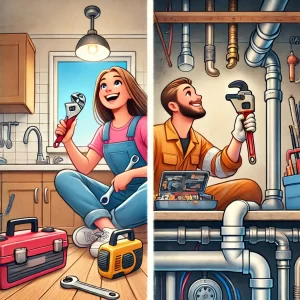DIY Plumbing Fixes vs. When to Call a Professional: A Handy Guide

Plumbing issues can range from the minor and manageable to the urgent and complex. Knowing when you can handle a problem yourself and when it’s time to call in a professional can save you time, money, and potential disaster. Here’s your guide to understanding which plumbing fixes are DIY-friendly and when it’s crucial to dial up a pro.
DIY Plumbing Fixes
1. Clogged Drains A common issue in many homes is a clogged drain. For minor clogs, using a plunger can often resolve the issue. Alternatively, a mixture of hot water, vinegar, and baking soda can help clear build-ups of grease and soap residue in your pipes.
2. Running Toilets A running toilet can usually be fixed by adjusting or replacing the flapper or fill valve. These parts are readily available at hardware stores and come with instructions for easy DIY installation.
3. Leaky Faucets A dripping faucet often requires a new washer or O-ring, both of which are easy to replace. Shut off the water supply, disassemble the faucet, and replace the worn parts. This not only stops the annoyance but also saves water and money.
4. Showerhead Issues If your showerhead is clogged with mineral deposits, a simple cleaning may be in order. Detach the showerhead and soak it in vinegar overnight. If it’s leaking, ensure that it’s screwed on tightly or replace the washer inside.
When to Call a Professional Plumber
1. Low Water Pressure Throughout the House If low water pressure affects more than one area, this could indicate more significant issues like hidden leaks or problems with the water main. These scenarios require professional tools and expertise.
2. No Hot Water If your water heater is not heating, leaking, or making strange noises, it’s time to call a professional. Water heaters involve complex and potentially dangerous components like gas lines and high-voltage electrical parts.
3. Major Installations Any major installations, such as bathtubs, new showers, or water heaters, should be handled by a professional to ensure they are installed correctly and comply with local building codes.
4. Sewer Smells or Backups Bad smells or sewer backup are signs of serious problems that could be hazardous to your health. These issues typically require specialized equipment and knowledge to resolve safely.
5. Frozen Pipes Frozen pipes are a critical issue that can lead to bursts and extensive water damage. If you suspect your pipes are frozen, it’s crucial to shut off your water immediately and call a plumber, as they need to be thawed correctly to avoid bursting.
Why Knowing the Difference Matters
Understanding what you can fix yourself and what requires a professional can greatly affect the longevity and efficiency of your plumbing system. While DIY fixes can be cost-effective for minor issues, knowing when to call in a professional can prevent costly repairs, reduce water waste, and protect your home from significant damage.
Always assess the situation carefully, and when in doubt, consult with a professional plumber. They can offer advice, service, and peace of mind, ensuring that your plumbing system remains in top condition.